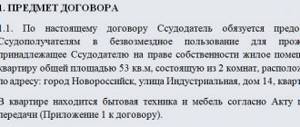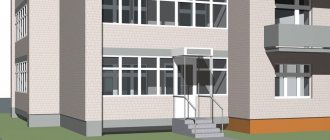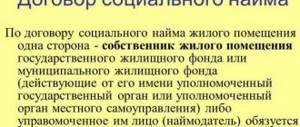A sample statement of claim to determine the procedure for using an apartment and to divide a financial personal account to pay for utilities has been prepared taking into account the norms of current legislation (Part 1 of Article 247 of the Civil Code of the Russian Federation).
How to determine the procedure for using an apartment in shared ownership and dividing utility bills between the owners of the premises? To do this, you need to file a claim in court.
In everyday life, situations are common when an apartment has several owners, and they do not quite get along with each other. In such circumstances, it is necessary to carry out a judicial procedure and establish the procedure for using real estate.
Determining the procedure for using an apartment in shared ownership
This can be done by written agreement between the parties.
However, in most cases, a claim is being prepared to determine the procedure for using the apartment. Based on the results of its consideration, the judge determines who will get which room.
Let’s make a reservation right away that the process is initiated in relation to housing that is privately owned.
In relation to real estate of municipal housing stock or social rental apartments, the legislation does not provide for the establishment of rules for the joint use of residential premises.
Determining the procedure for using an apartment means that each owner receives a separate room. The entire area of the apartment with common areas (corridors, kitchens, bathrooms) is not divided and is used equally by everyone.
The parts that go to each owner may not necessarily correspond to shares in the property.
If the areas are disproportionate, then other owners may insist on providing monetary compensation. To do this, they must provide a calculation of the market value of the disputed square meters.
Determining the procedure for using an apartment in shared ownership also involves resolving the issue of utility costs. You must first obtain an extract from Rosreestr for your share in the property.
Then you can contact resource supply organizations in order to split your personal account for utility bills. Such division is possible only between owners.
Other persons registered in the apartment cannot count on a separate personal account.
Determining the procedure for using the apartment
- home
- /
- Category: Housing disputes
- /
- Determining the procedure for using the apartment
Category: Housing disputes | Jun 01, 2016
Determining the procedure for using an apartment (residential premises)
One of the equally pressing practical issues that arise when using common property is determining the procedure for using this property. Since participants in shared ownership own ideal shares, they often cannot agree among themselves on how such property should be used. If, for example, we are talking about an apartment, the question arises: what does each of the shared owners have the right to claim? What if the apartment does not have rooms that are proportionate to the area corresponding to their ideal share of ownership of the common property? In such a situation, in order to resolve conflict situations or anticipate them, any of the shared owners has the right to raise in court the issue of determining the procedure for using the common property. Let us consider what nuances should be taken into account when filing such a claim using the example of determining the procedure for using an apartment. According to paragraph 37 of the Resolution of the Plenum of the Armed Forces of the Russian Federation and the Plenum of the Supreme Arbitration Court of the Russian Federation dated July 1, 1996 N 6/8, it is impossible to divide property in shared ownership in kind or to allocate a share from it, including in the case specified in part 2 p. 4 tbsp. 252 of the Civil Code of the Russian Federation, does not exclude the right of a participant in common shared ownership to make a demand to determine the procedure for using this property, if this procedure is not established by agreement of the parties. In resolving such a requirement, the court takes into account the actual procedure for using the property, which may not exactly correspond to the shares in the right of common ownership, the need of each of the co-owners for this property and the real possibility of joint use. By making a request to determine the procedure for using the apartment, the plaintiff, in accordance with Art. 56 of the Code of Civil Procedure of the Russian Federation must present to the court his own version of this procedure: transferring to him a specific room in the apartment, leaving the defendant another, etc. The court takes into account the size of the shares of the plaintiff and other participants in the common shared property, determines what area in the apartment corresponds to the plaintiff’s share and what he has the right to claim. The fact that the room he is requesting in the apartment will be smaller in area than his share will be assessed in favor of the plaintiff. However, even if the area of the requested apartment turns out to be larger, this does not mean that the court will refuse to satisfy the claim, since a slight deviation (2 - 3 sq. m.) in area is not significant. Thus, in one case, the court indicated: the fact that the defendant received, when determining the order of use, a room of a smaller area (less by 5 sq. m.), does not indicate a violation of his rights and legitimate interests, since determining the order of use of the apartment does not entail a change in the ratio itself shares in the ownership of it, the size of such shares remained the same (Appeal ruling of the Lipetsk Regional Court dated May 23, 2012 in case No. 33-1074/2012). This legal position can be found in the practice of other courts of general jurisdiction (Cassation ruling of the Belgorod Regional Court dated September 13, 2011 in case No. 33-3169). However, there is another opinion on this issue: when resolving one case, the court considered that the excess of the area of the room requested by the plaintiff over the size of his ideal share, amounting to 4.5 square meters. m cannot be considered insignificant, since such a state of affairs will significantly violate the rights of the remaining participants in the common shared property, which contradicts paragraph 2 of Art. 247 of the Civil Code of the Russian Federation (Appeal ruling of the Moscow City Court dated 04/06/2012 in case No. 11-2914). In this regard, the plaintiff should take into account that if the room he is requesting is larger in area than what he has the right to count on based on the size of his ideal share in the ownership of the apartment, his claim may be denied. However, he may provide other evidence that, as a result of establishing the procedure for using the apartment in accordance with the option proposed by him, the rights and legitimate interests of the remaining participants in the common shared ownership will not be violated (for example, the absence of a balcony or loggia in the room requested by the plaintiff and their presence in the remaining rooms , view from the window, etc.), or provide evidence that the plaintiff has the right to count on some deviations in his favor in the distributed area (the presence of a dependent minor child, etc.). When resolving this dispute, as noted above, the court also takes into account the need of each of the participants in the common shared ownership of residential premises: the presence of other apartments on the right of ownership or other right, the plaintiff’s sale of his apartment, in connection with which the apartment for which he asks to determine the order of use is the only one for him to live in, and whether the defendant has other residential premises, etc. (Cassation ruling of the Volgograd Regional Court dated October 12, 2011 in case No. 33-13161/11). The court may refuse the plaintiff’s claim to determine the procedure for using the apartment if during the trial it is established that he has abused his right, which is directly prohibited by Art. 10 Civil Code of the Russian Federation. Thus, in one case, the plaintiff, having other residential premises on the right of ownership, raised the question of determining the procedure for using another apartment, in which he had never lived, and allowed tenants into his area, which, in the opinion of the court, indicated that he had no real need in living in the specified apartment (Determination of the Moscow City Court dated March 20, 2012 in case No. 33-5757). The determination of the procedure for using an apartment is based on the equality of rights to allocate to each owner a part of the property for exclusive possession and use, moreover, the rights of a participant in shared ownership cannot be limited by the absence in the apartment of a room that exactly corresponds in size to the size of his share in the ownership right. If, during the consideration of the dispute regarding the determination of the procedure for using the apartment by the defendant on the merits of the variant of the procedure for use stated by the plaintiff, no objections were raised, the evidence and arguments presented by him were not refuted, a violation of his personal rights and legitimate interests was not declared and relevant evidence was not presented in the case materials, the court , most likely, will satisfy the claims if the plaintiff’s proposed option for determining the procedure for using the apartment is reasonable and rational (Appeal ruling of the Supreme Court of the Republic of Tatarstan dated September 3, 2012 in case No. 8008/12).
Cancel reply
This site uses Akismet to reduce spam. Find out how your comment data is processed.
Features of preparation for trial
A statement of claim to determine the procedure for using the apartment is submitted to all other owners at the same time. At the same time, it is possible that a counterclaim will follow from them.
The conflict between the owners will be considered by the district court at the location of the disputed apartment. As for the state duty, it is charged based on non-property requirements and amounts to 300 rubles.
It should be taken into account that the court has the competence to establish a different procedure for using an apartment in shared ownership compared to the one proposed in the text of the claim. A number of factors will be taken into account.
This includes the size of each owner’s share, participation in the maintenance of housing, the age of the co-owners and their state of health. In general, each situation is individual.
Before filing a claim, you should do some preparatory work. In particular, you need to take an extract from the Unified State Register of Property Rights, as well as a certificate from the Housing Office about persons permanently residing in the disputed apartment, including members of the plaintiff’s family.
What does the court take into account when determining the procedure for using an apartment?
First of all, the right of ownership and the proportionality of the allocated shares are taken into account, as well as the actual established procedure for use and the need of the owners. Many are confident that the court is obliged to take into account the interests of minor children, disabled people or pensioners who live in the disputed apartment. However, if these citizens are not participants in shared ownership, but are only members of the owner’s family, the court may consider the claim to assign them the use of one or another premises in the apartment as unfounded and reject it.
To resolve controversial issues regarding the determination of the right to use an apartment, contact a housing lawyer. Please note that filing a claim to determine the procedure for using an apartment in court is a last resort. After all, after legal proceedings, relations between owners may deteriorate so much that none of them will be able to exercise their legal right of use. Sign up for a consultation with an experienced lawyer who will help you break down the legal provisions and understand how best to act in your particular situation.
Contents of the statement of claim
For the category of cases we are considering, it is important to correctly draw up documents for the court. And if it is necessary to determine the procedure for using an apartment, a sample claim can be downloaded on our website completely free of charge.
Which of its provisions, first of all, should be emphasized?
So, it is worth correctly indicating the name of the court and information about all defendants (other owners).
You need a description of your position from the description of the apartment. Write the address, the number of rooms, indicating the area of each of them. Then you should provide evidence of the tenants' ownership, indicating the size of each of them's shares.
It is advisable to attach a layout of the apartment to the claim. This way the court will have a clear idea of the location of the rooms and other important details. To do this, you need to order a technical and cadastral passport of the apartment.
A significant part of the claim should be devoted to arguing that the procedure for using an apartment in shared ownership should be exactly the same as that proposed by the author of the appeal to the court.
And here you can refer to the size of the share, the bearing of a significant part of the costs of utility bills, the state of health, and the behavior of other residents.
The requirements should indicate the distribution of rooms between the plaintiff and defendants, indicating their area. In addition, it is worth writing about the compulsion to divide your personal account for utilities.
Question:
Hello, during the division of property through the court, I was awarded 1/2 share in a one-room apartment, the only room about 15 meters is occupied by my wife, her mother also lives there, they won’t let me live there, I demanded through the district police officer to kick out my mother-in-law, but when he she came and claims that she does not live there, but is visiting her daughter and will leave soon, what rights does a guest registered in the apartment have? How can we prove that she is not a guest, but lives with us permanently? Who is a guest according to our laws? How can I determine the order of use in this apartment?
Answer:
According to Art. 247 of the Civil Code of the Russian Federation, if the property is in shared ownership, its use is carried out by agreement of all participants. If an agreement is not reached, the procedure for using the apartment is established by the court, based on current legislation. It is not possible to allocate a share in kind in a one-room apartment (a one-room apartment is an indivisible thing).
Judicial practice throughout the Russian Federation boils down to the fact that it is not possible to determine the procedure for using a one-room apartment. Even if the area of the apartment is 40 square meters and there are only two co-owners who each own ½ of the living space, the court will still refuse the claim. In this case, the court, when considering the case, can assign the right to use the apartment to one of the co-owners, obliging him to pay compensation to the other co-owners who will not be able to use this apartment. In this case, it is taken into account which of the co-owners already lives in the apartment, and whether there is another residential premises owned by right of ownership.
In your situation, most likely, it would be better to reach an agreement with your ex-wife on the sale of the apartment; you can involve a family lawyer in the negotiations who will explain the benefits to each of the parties in the event of a peaceful resolution of the problem. You also have the right to sell your share of the apartment yourself (having previously offered to buy it to the second co-owner) if you find a buyer.
To move into your mother’s apartment, your ex-wife was obliged to obtain your consent. Since you are against your former mother-in-law living in the apartment, you have the right to evict her in court. However, this is very difficult, since you will need to prove that the former mother-in-law actually permanently resides in the apartment (witness testimony, a police officer’s certificate, etc. are needed). Most likely, the defendant will deny this and claim that she lived temporarily or is simply visiting .
The court's decision
As a rule, several hearings take place in a dispute, during which the judge finds out all the important details. When the claim is satisfied, the court determines which room will go to each owner for use. In addition, the issue of utility bills can be resolved.
Compensation for legal costs is also awarded. It is recovered from the remaining defendants, including on the basis of a writ of execution.
Like any other judicial act, a court decision on the use of an apartment can be reviewed by appeal. You have a month to file a complaint. After the case is considered by the appellate court, the introduced regime for using the apartment will receive full legal confirmation.
Why you shouldn’t neglect the help of a lawyer
When the court determines how the premises in the apartment should be used, then each of the residents has the right to calmly install a lock on their room. If other owners create obstacles, it is possible to resort to the help of the police or bailiffs.
Before you begin work on determining the procedure for using an apartment, it is useful to talk with a lawyer. He will study the situation and provide all necessary advice. The specialist will also tell you about all the possible risks that may lie in wait on the way to your goal.
If assistance in drawing up a claim and its support in court is needed, then a lawyer will also take on this work.
Remember that the best option would be to amicably agree on the procedure for sharing the apartment. This will help save time, nerves and finances.
Procedure for using residential premises: judicial practice
Determining the mechanism for using residential premises is one of the ways to protect property rights. Often, such disputes arise when there was a division of an apartment with maternity capital.
The court not only has the right to distribute rooms in the apartment. It is within his competence to provide access to a person whose interests are infringed.
Judicial practice shows that decisions are made to move in and transfer copies of keys to the plaintiff. In this case, the claim may raise several demands simultaneously.
When considering a case, the courts also rely on the position of other persons living in the apartment. If the proposed use option puts them in a deliberately disadvantageous position, then a refusal to satisfy the claims may follow.
Below are several examples from judicial practice. All names of participants in the cases have been changed.
The right to use a privatized apartment
Citizen Emelyanov filed a lawsuit against his ex-wife; he asked to divide the apartment. Also, the subject of the requirements was the recognition of ownership of ½ share and the determination of the procedure for using the residential premises. In particular, the plaintiff asked to assign a room of 15 square meters to him. m.
The application is motivated by the fact that during the period of the marriage, the parties to the dispute privatized the apartment without allocating shares. Subsequently, family relations were terminated. At the time of filing the claim, the defendant was obstructing the use of the property.
The Cheryomushkinsky District Court of Moscow, by its decision dated July 09, 2017, in case No. 2-1633/17, satisfied the claim. He assigned each spouse a room in a two-room apartment.
Moving into the apartment and determining the mode of its use
This problem is relevant when the owners of the apartment are strangers. The plaintiff, Fedorova, filed a lawsuit against the defendant, Petrov. In her appeal, she asked to be moved into the living space, to oblige the other party not to interfere with her stay and to hand over duplicate keys.
A separate requirement was to determine the procedure for using a three-room apartment. Fedorova asked to be given a room of 11 square meters. m..
The statement is motivated by the fact that Petrov is the owner of ¾ of the disputed property. Fedorova inherited the remaining quarter from her mother, but due to the fault of the defendant, she does not have access to it.
The Cheryomushkinsky District Court of Moscow satisfied the claims in full. By decision of March 29, 2016 in case No. 2-1986/11, the judge moved Fedorova into the disputed apartment, ordered the defendant not to create obstacles in living and divided the rooms. The auxiliary spaces remained in shared use.
Respect for the interests of other owners
When determining the procedure for using residential premises, the court takes into account the interests of other persons living in it. The following dispute can be cited as an example. Citizen Nikitina appealed to the court to the defendants Smirnova and Smirnov. She asked to be moved into the apartment and not to interfere with her use of the premises.
In addition, the question was raised about the allocation of a non-passable room. The court found that Nikitina and Smirnova own a three-room apartment in equal shares. And also, with reference to materials from law enforcement agencies, it is confirmed that Smirnova does not allow Nikitina into her home.
By the decision of the Cheryomushkinsky District Court of Moscow dated February 1, 2016 in case No. 2-176/13, the request for Nikitina’s accommodation was satisfied. At the same time, the court considered the mechanism for distributing rooms proposed in the lawsuit to violate the interests of the defendants, since they get access to the territory. Therefore, this part was rejected.
Resolution of the RF Armed Forces on establishing the procedure for using an apartment
Determination of the Investigative Committee for civil cases of the Supreme Court of the Russian Federation dated January 17, 2020 N 117-KG16-10 The court canceled the judicial acts adopted in the case on determining the procedure for using the apartment, eliminating obstacles in using the apartment by moving in and sent the case for a new trial, since the lower courts all the circumstances essential for the correct resolution of the case were not investigated
March 6, 2017
Judicial Collegium for Civil Cases of the Supreme Court of the Russian Federation, consisting of
presiding Klikushin A.A.
judges Yuryeva I.M. and Gorokhova B.A.
considered in open court a civil case based on the claim of Ginkul L.E.-G. to Skumina L.N. on determining the procedure for using the apartment, eliminating obstacles in using the apartment, moving in, according to the counterclaim of L.N. Skumina. to Ginkul L.E.-G. on termination of the right of common shared ownership, payment of compensation
on the cassation appeal of the representative Skumina L.N. — Kopchinsky A.Yu. on the decision of the Nakhimovsky District Court of Sevastopol dated February 15, 2020 and the appeal ruling of the judicial panel for civil cases of the Sevastopol City Court dated May 12, 2016.
Having heard the report of the judge of the Supreme Court of the Russian Federation A.A. Klikushin, having listened to the explanations of the representative L.N. Skumina. — Saprygin K.V., who supported the arguments of the cassation appeal, the Judicial Collegium for Civil Cases of the Supreme Court of the Russian Federation established:
Ginkul L.E.-G. filed a lawsuit against L.N. Skumina. on determining the procedure for using the apartment, eliminating obstacles to using the apartment by moving in. In support of the claim, Ginkul L.E.-G. indicated that she is the owner of a 1/4 share in the ownership of a three-room apartment located at the address: ... The remaining 3/4 shares in the ownership of the apartment at the specified address belong to L.N. Skumina. The plaintiff indicated that she could not get into the apartment, since the defendant was preventing her from doing so, and asked the court to allocate for her use in the disputed apartment a room with an area of ... sq.m., which corresponds to her share.
Skumina L.N. filed a counterclaim against Ginkul L.E.-G. on the termination of the right of common shared ownership of the apartment at the above address, by purchasing the property belonging to Ginkul L.E.-G. shares in the ownership of the apartment with payment of compensation in the amount of 740,000 rubles. In support of the claim of Skumin L.N. indicated that belonging to Ginkul L.E.-G. the share in the common property right is insignificant, cannot be separated, and the defendant does not have a significant interest in the use of the common property. Also Skumina L.N. indicated that an agreement had previously been reached between the co-owners to buy out a 1/4 share of ownership in the disputed apartment, but due to the overestimation of the real value of the specified share, the transaction was not completed.
By the decision of the Nakhimovsky District Court of Sevastopol dated February 15, 2020, the claim of Ginkul L.E.-G. partially satisfied, she moved into the disputed apartment. In satisfying the counterclaim of Skumina L.N. denied.
By the appeal ruling of the judicial panel for civil cases of the Sevastopol City Court dated May 12, 2020, the decision of the trial court regarding the refusal of Ginkul L.E.-G. in satisfying the claim to determine the procedure for using the apartment was canceled and in this part of the case a new decision was made, which satisfied the claim, for the use of Ginkul L.E.-G. a room with an area of ... sq.m. was transferred. The rest of the decision of the trial court was left unchanged.
In the cassation appeal of the representative Skumina L.N. — Kopchinsky A.Yu. the question is raised about the cancellation of these court decisions as illegal.
By the ruling of the judge of the Supreme Court of the Russian Federation A.A. Klikushin dated November 30, 2020, the cassation appeal with the case was transferred for consideration at a court hearing of the Judicial Collegium for Civil Cases of the Supreme Court of the Russian Federation.
Having checked the case materials and discussed the arguments of the cassation appeal, the Judicial Collegium for Civil Cases of the Supreme Court of the Russian Federation finds that there are grounds for canceling the court decisions taken in the case.
In accordance with Article 387 of the Civil Procedure Code of the Russian Federation, the grounds for canceling or changing court decisions in cassation are significant violations of substantive law or procedural law that influenced the outcome of the case and without eliminating which it is impossible to restore and protect violated rights, freedoms and legal interests, as well as protection of public interests protected by law.
Such violations of substantive and procedural law were committed during the consideration of this case by the courts of first and appellate instances.
As established by the court and follows from the case materials, the disputed residential premises are a three-room apartment with a total area of ... sq.m and a living area of ... sq.m, located at the address: ... (case sheet 16-17).
In accordance with the certificate of state registration of rights dated August 28, 2020, Ginkul L.E.-G. is the owner of 1/4 share in the right of common shared ownership of this apartment (case sheet 8). The remaining 3/4 shares in the disputed apartment belong to L.N. Skumina.
In accordance with the certificate of the State Unitary Enterprise of Sevastopol “Unified Information and Settlement Center” dated October 1, 2020, L.N. Skumina is registered in this apartment. and her relatives (5 people in total) - ld. 98.
Resolving the dispute and partially satisfying the initial claim of Ginkul L.E.-G., the court of first instance proceeded from the fact that Ginkul L.E.-G. deprived of the opportunity to move into the disputed apartment and live in it, where she owns a 1/4 share of the ownership.
Refusing to satisfy the counterclaim of Skumina L.N. on the redemption of Ginkul L.E.-G. shares in the right of common shared ownership of an apartment, the court of first instance proceeded from the fact that the defendant’s share is not insignificant, and in addition, indicated that the application of the provisions of paragraph 4 of Article 252 of the Civil Code of the Russian Federation on forced compensation for an insignificant share in the total property is possible only in relation to a participant in common property who has submitted a claim for the allocation of his share. The court pointed out that the provision of the above paragraph of Article 252 of the Civil Code of the Russian Federation does not imply deprivation of the owner, who has not made a demand for the separation of his share from the common property, of his right of ownership of the property against his will by paying him compensation by the remaining co-owners, since otherwise would be contrary the principle of inviolability of property rights.
The appellate court agreed with these conclusions, leaving the decision of the first instance court in this part unchanged, in the remaining part it made a new decision, which, taking into account the property of Ginkul L.E.-G. share in the ownership of the disputed apartment allocated a room with an area of _ sq.m. for its use.
The Judicial Collegium for Civil Cases of the Supreme Court of the Russian Federation finds that court decisions were adopted with a significant violation of the norms of substantive and procedural law and cannot be agreed with for the following reasons.
According to paragraph 1 of Article 252 of the Civil Code of the Russian Federation, property in shared ownership may be divided between its participants by agreement between them. A participant in shared ownership has the right to demand the allocation of his share from the common property (clause 2 of Article 252 of the Civil Code of the Russian Federation). If the participants in shared ownership fail to reach an agreement on the method and conditions for dividing the common property or the allocation of the share of one of them, the participant in shared ownership has the right to legally demand the allocation in kind of his share from the common property. If the allocation of a share in kind is not permitted by law or is impossible without disproportionate damage to property in common ownership, the allocated owner has the right to have the value of his share paid to him by other participants in shared ownership (clause 3 of this article).
Paragraph 4 of the above-mentioned Article 252 of the Civil Code of the Russian Federation stipulates that the disproportionality of the property allocated in kind to a participant in shared ownership on the basis of this article and his share in the ownership right is eliminated by payment of an appropriate sum of money or other compensation. Payment of compensation to a participant in shared ownership by the remaining owners instead of allocating his share in kind is permitted with his consent. In cases where the owner’s share is insignificant, cannot be realistically allocated and he does not have a significant interest in the use of the common property, the court may, even in the absence of the consent of this owner, oblige the remaining participants in the shared ownership to pay him compensation. Upon receipt of compensation in accordance with this article, the owner loses the right to a share in the common property (clause 5 of the article).
From the content of the above provisions of Article 252 of the Civil Code of the Russian Federation, it follows that participants in shared ownership have the right, by reaching an agreement on the method and conditions for dividing common property or allocating the share of one of them, to divide the common property or allocating a share among themselves, and in the event of failure to reach such an agreement - go to court to resolve the dispute.
The provisions of paragraph 4 of Article 252 of the Civil Code of the Russian Federation apply both to the claims of the separated owner and to the claims of the remaining participants in the common shared ownership (in this case, the demands of L.N. Skumina), therefore L.N. Skumina, as a participant in shared ownership, exercising this right, filed a claim against co-owner Ginkul L.E.-G.
By establishing in paragraph 4 of Article 252 of the Civil Code of the Russian Federation the possibility of forced payment to a participant in shared ownership of monetary compensation for his share, and, consequently, the loss of his right to a share in the common property, the legislator proceeded from the exclusivity of such cases, their admissibility only under specific circumstances and only to the extent necessary to restore the violated rights and legitimate interests of other participants in shared ownership.
As can be seen from the case, owned by L.N. Skumina. the share in the ownership of residential premises at the address: ... exceeds the share in the ownership of the defendant Ginkul L.E.-G. (Skumina L.N. owns 3/4 shares, while Ginkul L.E.-G. owns 1/4 shares).
The living area of the disputed apartment is ... sq.m., the apartment consists of three rooms measuring ... sq.m., ... sq.m. and ... sq.m. The size of the living space corresponding to that belonging to Ginkul L.E.-G. share in the right to the apartment is ... sq.m.
Under such circumstances, the allocation for the use of the defendant of a room of the specified size, which is not isolated, but adjacent to a room with an area of ... sq.m. assigned to L.N. Skumina, violates the rights of the latter, since as a result of such allocation the size of the property belonging to L.E. Ginkul .-G. share in the ownership of the apartment was increased from ... sq.m to ... sq.m at the expense of the living space owned by L.N. Skumina.
In addition, in the statement of claim Skumin L.N. referred to the fact that Ginkul L.E.-G. does not have a significant interest in the use of common property, as evidenced by the existence of an agreement between them to conclude a purchase and sale agreement belonging to Ginkul L.E.-G. shares, in addition, Ginkul L.E.-G. never lived in the disputed apartment, which she did not deny in the court hearing, and has another residential premises as the right of ownership.
By virtue of Part 2 of Article 56 of the Civil Procedure Code of the Russian Federation, the court determines what circumstances are important for the case, which party must prove them, and brings the circumstances up for discussion, even if the parties did not refer to any of them.
According to Part 4 of Article 67 of the above-mentioned code, the court is obliged to reflect the results of the assessment of evidence in a decision, which provides the reasons why some evidence was accepted as a means of substantiating the court’s conclusions, other evidence was rejected by the court, as well as the reasons why some evidence was given preference over others.
In this case, based on the claims stated by the parties, their justification, as well as taking into account the provisions of Art. 252 of the Civil Code of the Russian Federation, a legally significant and subject to proof circumstance was the clarification of the circumstances whether the property can be used by all co-owners for its intended purpose (for living) without violating the rights of the owners who have a large share in the ownership; is it possible to provide the defendant with the use of residential premises commensurate with his share in the ownership of the apartment; whether the defendant has a significant interest in the use of common property.
The correct application of the provisions of Articles 247, 252, 304, 305 of the Civil Code of the Russian Federation to controversial legal relations depended on the clarification of these circumstances.
However, the court, in violation of Part 2 of Article 56 of the Civil Procedure Code of the Russian Federation, did not determine these circumstances as legally significant for the correct resolution of the dispute; they were not included in the subject of evidence in the case and did not receive a legal assessment by the court.
Taking into account the above, the Judicial Collegium for Civil Cases of the Supreme Court of the Russian Federation finds that the violations of substantive and procedural law committed by the courts of first and appellate instances are significant, they influenced the outcome of the case and without their elimination it is impossible to restore and protect the violated rights and legitimate interests of the applicant, in connection with which the decision of the Nakhimovsky District Court of Sevastopol dated February 15, 2016 and the appeal ruling of the judicial panel for civil cases of the Sevastopol City Court dated May 12, 2016 cannot be recognized as legal, they are subject to cancellation and the case is sent for a new trial to the court of the first authorities.
When reconsidering the case, the court should take into account the above, determine the nature of the legal relations of the parties and resolve the dispute in accordance with the circumstances established in the case and the requirements of the law.
Guided by Articles 387, 388, 390 of the Civil Procedure Code of the Russian Federation, the Judicial Collegium for Civil Cases of the Supreme Court of the Russian Federation determined:
the decision of the Nakhimovsky District Court of Sevastopol dated February 15, 2016 and the appeal ruling of the judicial panel for civil cases of the Sevastopol City Court dated May 12, 2016 are cancelled, and the case is sent for a new trial to the court of first instance.
Chairman Klikushin A.A.
Judges Yuryev I.M.
Gorokhov B.A.
GARANT.RU: https://www.garant.ru/products/ipo/prime/doc/71497516/#ixzz5b4sGCwZh
Recommendations before going to court
It is necessary to determine the regime for the use of residential premises in court when a voluntary agreement has not been reached between the co-owners. The claim must provide evidence that the interested party has barriers.
Below are other useful tips:
- One of the attachments to the statement of claim should be an explication of the apartment. This will show the technical characteristics of the room the plaintiff is claiming.
- If the allocation of the desired room is due to health conditions, the presence of children, or other objective reasons, the application provides a link to the relevant evidence.
- When determining the procedure for using an apartment is inextricably linked with forced eviction, certificates from the police may be required. It is the district police officer who often records the fact of obstacles on the part of the defendant.
- In some situations, courts pay attention to the ratio in which utility bills are paid between owners. Therefore, you can attach the relevant receipts.
- Provided that the plaintiff has made repairs in the disputed room, it is recommended to include evidence of payment of the relevant expenses.
When the order of use of the living space is determined, the owner of the room has every right to put a lock on the door and use it at his own discretion. In this case, you must comply with the requirements of the Housing Code of the Russian Federation.
Author: Oleg Vladimirovich Roslyakov, source.
Residential premises: order of use
Use of residential premises
The name of the procedure for the use of residential premises was given to a number of rules agreed upon by those who executed the initial agreement of shared ownership.
It often happens that this phenomenon develops over a certain period of time.
According to the standard rules of use, each owner can occupy one or two premises.
Depending on certain shares of ownership. A separate agreement between the owners can be created regarding the so-called common areas. This is true when the conversation concerns communal apartments.
Many are interested in whether and how it is possible to determine the order of use for so-called municipal apartments. If the apartment is not privatized, then the residents can simply draw up a general agreement regarding it. But allocating one room to each tenant is unacceptable; there can be no question of this in this case. It does not matter whether there are disagreements between the parties to the agreement or not. The same thing happens when the procedure for using a residential building is determined.
Finally, the text of the current law does not provide for the possibility of formalizing the procedure for use of housing for which a social tenancy agreement has been drawn up.










